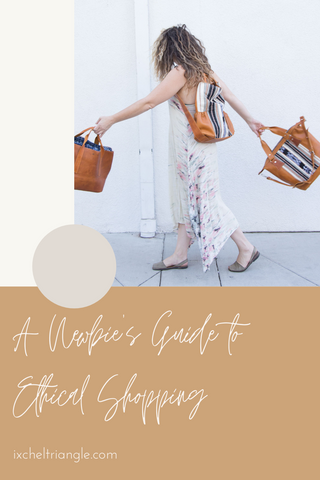Want to know the very basics of how to get moving with ethical shopping for yourself and your household? A lot of people do, there just isn’t a ton of information available on the very first steps. You’ve got the mindset, now you need the “how-to” on the follow through. We’re here to help.

The first thing you’ll want to do is familiarize yourself with a few business directories and stamps of approval for ethical businesses, which you can learn about here. This will be key for exploring brands and testing to see which ones you can trust, and which ones put on a face for marketing.
But if you’re looking for practical ways that you can get started with shopping ethically, here’s where we’d recommend you find your footing.
Replace Unethical Kitchen Items as They Run Out
It’s easy to want to ditch all of the seemingly unethical or not environmentally friendly products that live in your kitchen -- but part of shopping ethically is reducing waste, so ditching things unnecessarily isn’t the best place to start.

Take a mental inventory of what you currently have in your kitchen that are things you’ll run out of and need to replace anyways. Are you using tin foil, ziploc bags, or saran wrap for storing food? Are the cleaners under your sink environmentally safe and healthy for your home? (To start, take a look at the ingredients and try to omit the ‘toxic trio’ -- parabens, triclosan, and phthalates) Are there glass products you’ll want to hang onto for food storage and tupperware options? Also being mindful of the packaging of your groceries -- ask yourself, “Is this packaging recyclable?” or “Is there an option available that would produce less waste?”
As you begin to run out of things, take a peek at some of the options available from our friend’s at Package Free Shop. They have a section on their website where you can shop specifically for your kitchen. (among many other areas of your home, too)
Take Inventory of Your Current Wardrobe
Omitting fast fashion from your wardrobe can be tricky because we’ve been trained to think that things should be much cheaper than the ethical price point they should be at. However, there are plenty of ways you can stay on budget while creating an ethical wardrobe of pieces you love. When starting out, approach your closet in a similar way you approached your kitchen. Ask yourself which pieces of clothing bring you joy when you wear them? Which ones are the last resort when everything else is dirty? Is there a particular wardrobe aesthetic you are drawn to that you’d like to have more of? The nice thing about clothes is that they are easy to donate. So if you aren’t in love with something, donate it. Who knows, maybe it will become someone else’s favorite piece?

It is worth noting that items that sit at your local Goodwill or Salvation Army for too long will unfortunately end up in the trash, also. So, for the items of clothing that are not salvageable or can not be donated, check out Earth 911’s Recycling Search page. You can easily type in your zip code and what kind of items you have to donate (not just clothing) and will be given a list of recycling options.
Once you’ve eliminated the pieces that you don’t want in your wardrobe -- begin collecting investment pieces. Ethical brands often create goods that will last longer and ultimately have about the same impact on your budget as buying a surplus of items that won’t last. Here are three places we’d recommend as your build out your ethical wardrobe:
- Poshmark, Tradesy, and Thread Up: shopping resale is one of the best ways that clothes can be recycled, you can find items you love, and stick to a budget while you shop
- The Good Trade created a list of 35 Ethical & Sustainable Clothing Brands Betting Against Fast Fashion that we love and think you will, too. It includes a pricing guide as well as detailed information about each brand.
- And of course, we at Ixchel Triangle would love for each of you to sport an ethical bag for all of your on-the-go needs!
Don’t Forget: Less Is More
A less is more mentality is really the best way to sink into shopping ethically for newbies and experts alike. Adopting a “less is more” mentality is something that each of us can do, today, for free. Reducing our household consumption will help save money, as well as the planet. Think about the life cycle of the item you are about to buy. Will it last a week in your home? A month? A year? Thinking about the entire life cycle of the goods you are about to buy will help you avoid spending unnecessarily and keep your ecological footprint to a minimum.
If something is on sale, ask yourself if you would buy this item at full price? If the answer is no, it may be more of a want than a need. There are, of course, exceptions for things that you’ve had your eye on for a while, and finally pull the trigger on once they are on sale. This is more of a rule of thumb for those impulse purchases where the price is the driving force to purchase.
What other tips are you interested in learning about ethical shopping? Let us know in the comments so we can join you in making the world a better place, one conscious consumer at a time.






Leave a comment